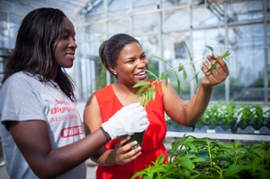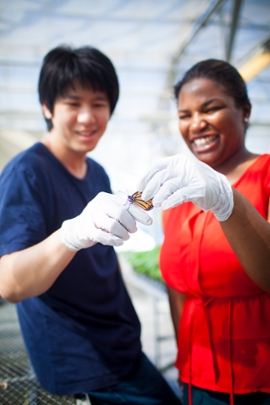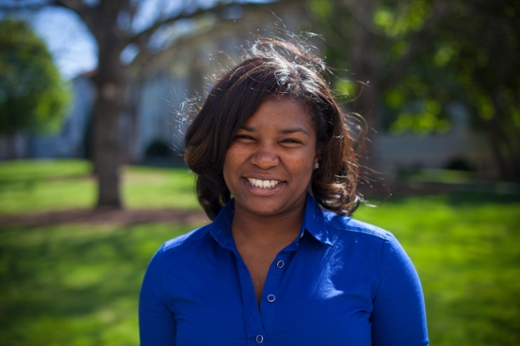The Laney Graduate School is proud to announce Erica Harris as a 2020 Eleanor Main Student Mentor Award recipient. Harris is graduating with a PhD in Population Biology, Ecology, and Evolution (PBEE). Throughout her graduate experience, she has received numerous research opportunities, grants, and awards and has demonstrated dedication to mentorship that extends beyond guiding students at Emory.
Named in honor of the late Dr. Eleanor Main, a transformative leader at Emory, and a devoted advocate for graduate education, the award recognizes individuals who exemplify mentoring of the highest quality in graduate education. Harris is one of two recipients of the award that is presented each year during the Laney Graduate School commencement ceremony.
"It is a privilege," she said. "For my mentees to think that I deserve this, makes me feel honored."

Harris's introduction to higher education began as a junior in high school, where she participated in the Minority Introduction to Engineering and Science (MITES) program at the Massachusetts Institute of Technology. MITES is a six-week academic enrichment program for rising high school seniors. It was through this experience that she was able to work alongside college students that included participants from historically underrepresented groups.
"If it weren't for MITES, I would not have known about my undergraduate program," Harris explains. "They offered college sessions and recruiters with information about options. "I was exposed to possibilities that I hadn't dared to dream until I started the program."
After high school, Harris studied biochemistry and cellular biology at Rice University in Houston. While at Rice, Harris's adviser was evolutionary biologist Dr. Joan Strassmann, who introduced Harris to the Mellon Mays Undergraduate Fellowship program – a program designed to prepare students from historically underrepresented groups to enter graduate and doctoral programs. Through this program, Harris engaged in professional development workshops that helped her build skills to be successful in her field.
"I would say the Mellon Mays program was instrumental in helping me become a professional academic," Harris said. "I was not a stellar student as far as grades and GPA at the end of my freshman year, but Dr. Strassmann still gave me a chance."
In 2013, after earning her undergraduate degree, Harris decided to pay it forward. She returned to MITES as a mentor and residential teaching assistant in biochemistry. Through this work, she mentored 78 high school students from historically underrepresented groups.
Continuing her academic journey, she was accepted into the PBEE program at the Laney Graduate School. While pursuing her PhD, she remained true to her passion for mentoring and returned to the Mellon Mays program as a graduate mentor for Emory University.
Harris used that momentum to take advantage of numerous research and mentorship opportunities throughout her graduate career. She mentored a total of 21 undergraduate students through the Strategies for Ecological Education, Diversity, and Sustainability (SEEDS) program. Through her work in this program, Harris helped students navigate the Annual Ecological Society of America Meeting and took them on national field trips to research field sites. Through her mentorship, she was able to provide the type of exposure that she received earlier on.
Her main priority was to give students the guidance they needed to make advancements in the program. Returning and branching out to these programs was a way for Harris to help other students aspire to even higher goals, especially students from historically underrepresented groups.
A significant strength of Harris that her mentees admire is the one-on-one approach. Among those students is Dr. Kim Hoang, a postdoctoral National Science Foundation Research Fellow in Biology at the University of Oxford.
"I cannot imagine how far I would have come if it were not for her mentorship," says Hoang.
Hoang first met Harris at a PBEE recruitment meeting. When the two became lab mates in Emory professor, Dr. Nicole Gerardo's laboratory, Hoang found Harris to be an incredible mentor.
"She helped me with classes and studying for my qualification exam," Hoang said. "She freely shared many professional development tips that she learned herself, and she guided me through tough times."
Whether her students are about to enter their undergraduate programs or exiting graduate school with PhDs, Harris encourages her mentees to embrace their differences and remain aware of their social responsibilities as scientists.

"I try to remind my mentees to maintain who they are as scientists and bring that to the table," Harris explained. "Do good science. We're all scientists, but we're different, and we shouldn't forget that."
After graduation, Harris plans to teach ecology, evolutionary biology, or animal behavior at Spelman College in Atlanta, GA. She is dedicated to the mission of historically black colleges and universities (HBCU) and is excited to bring her mentoring skills to Spelman.
While teaching at Spelman, Harris plans to incorporate the lessons passed on to her by Dr. Gerardo, who helped her understand the weight of every scientist's responsibility to society.
"One responsibility is learning to be good communicators," she said. "Another is making sure you have evidence-based work. I want to cultivate a community of critical thinkers. It's nice to be informed. Even if you are not going to be a scientist, it matters."

